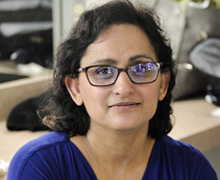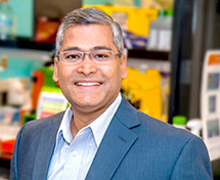Enhancing the Efficacy of Checkpoint Blockade Cancer Immunotherapy
Metabolic conditioning of T cells using IL-2
Technology Overview
 Dr. Vandana Kalia
Dr. Vandana Kalia Dr. Surojit Sarkar
Dr. Surojit Sarkar
Cancer immunotherapy with T cell-based therapies or biologic or other drugs can be highly effective. However, the effectiveness of these treatments is variable amongst individuals and also against distinct cancers, with excellent results against some types of cancer such as metastatic melanoma, and poor results against others such as pancreatic tumors. The effectiveness of cancer immunotherapy is also highly variability among individual patients.
Drs. Vandana Kalia and Surojit Sarkar are working on several strategies to improve cancer immunotherapy effectiveness. One area of their research focuses on the problem of T cell exhaustion. Cytotoxic CD8 T cells are the primary effectors in T cell-based anticancer therapy. When these cells become exhausted, their proliferation, cytokine production, and antitumor actions cease.
Based on their extensive experience studying the expansion, differentiation, and regulation of T cells, Drs. Sarkar and Kalia are examining how interleukin-2 (IL-2) can be used to modulate the T cell response. Specifically, they are investigating how IL-2 might be used to regulate the metabolism of effector T cells in immunotherapy to extend efficacy and prevent resistance to treatment.
IL-2 has both stimulatory and suppressive effects on CD8 T cells. Studies by the Kalia and Sarkar groups show that IL-2 signals are critical in determining if CD8 T cells become terminally exhausted or continue to respond to stimulation. The research teams are exploring ways to fine-tune the balance of IL-2 signals to create “metabolic springboard” conditions that promote augmented anticancer activity from CD8 T cells.
Drs. Sarkar and Kalia are interested in partnerships to study the clinical applications of their model of using IL-2 for rheostatic control of T cells. Their work is relevant to new strategies and treatment regimens for sustained, effective immunotherapy with boosted T cell activity during checkpoint blockade.
Stage of Development
-
Preclinical in vivo
Partnering Opportunities
- Collaborative research opportunity
- Sponsored research agreement
- Consultation agreement
- Licensing agreement
Publications
- Kalia V, Sarkar S. Regulation of effector and memory CD8 T cell differentiation by IL-2 – A balancing act. Front Immunol. 2018;9:2987. doi.org/10.3389/fimmu.2018.02987.
- Kalia V, Sarkar S. Antigen-addicted T cell reserves trickle charge the frontline killers. Immunity. 2016;19;45(1):10-12.
- Kalia V, Sarkar S, Subramaniam S, Haining WN, Smith KA, Ahmed R. Prolonged interleukin-2Rα expression on virus-specific CD8+ T cells favors terminal-effector differentiation in vivo. Immunity. 2010;32(1):91-103.
Learn More
To learn more about partnering with Seattle Children’s Research Institute on this or other projects, email the Office of Science-Industry Partnerships.